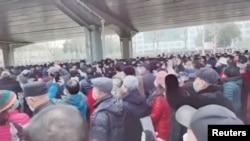Hundreds of discontented Chinese retirees protested on Wednesday because of cuts to their monthly medical allowances that are part of reforms to a complex public health care system strained by three years of pandemic-related expenses.
Social media posts show demonstrations erupted simultaneously in Wuhan, a city of 11 million people where the coronavirus was first identified in humans in late 2019, and Dalian in the northeast on Wednesday morning. In both cities, the protesters sang "The Internationale," the Marxist anthem. Some of the protesters chanted "Down with the reactionary government!"
VOA could not verify the authenticity of the social media content from the protests, during which several elderly demonstrators ended up on the ground after tussling with police.
The latest protests are pushing back against cuts first announced late last year and reflect a policy challenge familiar to many governments even before accounting for strains imposed by the pandemic: How to cover elder care costs while ensuring continued prosperity and care for everyone else.
Guangzhou was the scene of some of the first street protests last month in a nation where one-third of the population will be retirees in about 25 years, according to the 2020 census report by China's National Bureau of Statistics.
In one of China's health insurance systems, some money goes into individual accounts and some money goes into a centrally allocated fund to pay for medical claims. As COVID struck the elderly particularly hard, draining their personal accounts, the government slashed the amount going into the individual accounts and put that money into the common pool.
Since Wuhan officials began reforming the system on February 1, the cuts have been widespread. The monthly medical subsidy transferred to retirees' accounts has dropped by 70% from 286 renminbi (RMB) or roughly $42 to only 83 RMB or $12 and even the maximum funeral subsidy has been cut from roughly $10,250 to about $4,400.
A 60-year-old protester from Wuhan's Qingshan District told VOA Mandarin after the February 8 protest, "The purpose of the reform is to make people's lives better. The reform of medical care should move in the direction of free medical care for all. But what it is doing now is that it takes our money and reduces what we receive by more than 200" yuan or about $29. The RMB is China's official currency, and a yuan is a unit of the currency.
The demonstrator said that the protesters called on the authorities to restore the old system.
In response to the first protest, the Wuhan Municipal Medical Security Bureau issued a statement on February 9 saying, "After the reform, the scale of the centrally allocated fund will be larger, the ability to pay the claims of the insured employees will be stronger, and the protection for diseases will be more comprehensive."
Some protesters questioned why the reform didn't touch the benefits for civil servants. Calling the question a rumor, the city government said, "Their (the civil servants') benefits are often reduced the most." But the response didn't reveal how much the civil servants are being affected.
Guangdong, Shaanxi and Hunan provinces are also reforming their systems.
A 70-year-old man in Guangzhou who did not want to be named to avoid attracting official attention asked that VOA Mandarin use his alias, Guangzhou Uncle Ou. He said he suspects that the government's anti-COVID fight for three years has depleted the medical insurance fund, so it began to cut medical insurance subsidies.
"I used to get more than 400 (yuan) back (in my personal account), but now it is 160 (yuan)," Guangzhou Uncle Ou said. "I felt that it is really unreasonable." The more the medical insurance system was reformed the health care system, the worse it became, he said. "If you care about the people, the more reforms the better system. If the reforms made the system worse, then it is not called reform. That's called stealing our interests."
Guangzhou Uncle Ou said that he plans to hire a lawyer and file an administrative lawsuit, even though he knows his chance of winning the case is very slim.
Wu Shaoping, a former Beijing-based human rights lawyer now living in New York, said that while the current medical insurance system needs reform, local governments do not have the authority to unilaterally cut medical insurance benefits.
William Hsiao is the K.T. Li professor of economics emeritus in the Department of Health Policy and Management and Department of Global Health and Population at the Harvard T.H. Chan School of Public Health. He told VOA Mandarin that reforming the personal account system is the right thing to do because it is currently unfair.
"The principle of insurance is to prepare a centrally allocated fund, which pays for everyone's medical need [rich or poor]," he said. … "Some people are in good health, and they still pay the same money, but they will receive fewer benefits, and the health of the young is probably better than that of the old. This will unify the whole country. This is what it is like in the most advanced countries in the world."
He said that because the finances of China's medical system lack transparency, the public will inevitably question the system.
Huang Yanzhong, senior fellow for global health at the Council on Foreign Relations, told VOA the medical insurance system should be reformed, but the Chinese government rolled out the reforms before explaining what it was doing.
"We can say it's a miscommunication problem," he said. "They didn't do enough preparation, for example, explaining to the public that it won't hurt the people's interests. But they didn't. Instead, they carried out the reform immediately. So, it caused misunderstanding by the public."









